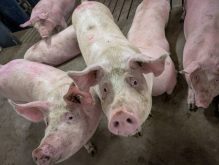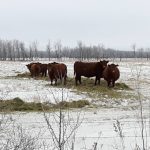Manitoba hog producers have received over $26 million to help small operators convert to large manure storages in advance of a 2013 ban on winter spreading.
The money from Ottawa and the province will cover 75 per cent of a producer’s construction costs to a maximum $250,000. Ottawa funds 60 per cent of the three-year program and the province picks up the remaining 40 per cent.
Also embedded in the federal component of the program are provisions to assist all producers affected by the new phosphorus regulations with adopting newer technologies to better manage the nutrient or reduce the cost of transporting it to areas where it is needed, Manitoba Pork general manager Andrew Dickson said.
Read Also

Trade uncertainty, tariffs weigh on Canadian beef sector as market access shifts
Manitoba’s beef cattle producers heard more about the growing uncertainty they face as U.S. tariffs, and shifting trade opportunities, reshape their market.
Manure applications are to be regulated according to a range of phosphorus thresholds. Some operations in southeastern Manitoba already exceed the threshold and can not apply any more manure to their land until phosphorus levels decline.
Effective Nov. 10, 2013, provincial regulations will prevent livestock operations under 300 animal units from spreading manure on fields in winter. Larger operations are already banned from winter spreading.
Many small producers say they cannot afford to build enlarged storages and may
shut down as a result. A 2006 report prepared by University of Manitoba researchers on the relative cost of compliance to the new regulations found smaller operators faced costs that were 2.5 times higher per pig than large-scale operations.
The money from the government should help them, said Manitoba Agriculture, Food and Rural Initiatives Minister Stan Struthers.
“The winter spreading ban is on the way. We think society needs to participate and help the farmers get to that point,” Struthers said during a Feb. 24 news conference in Winnipeg to announce the program.
The Manitoba Pork Council estimates between 60 and 100 hog producers in the Red River Valley alone are below 300 AU and will have to comply with the 2013 ban.
Dickson said manure storages also cost more to build in the Red River Valley than outside it. The valley is flood-prone and facilities must be built to a certain height to guard against flood waters.
Dickson said small operations often have manure storages located directly underneath the barns. They are not designed to hold manure for 300 days or more.
Some farms may incur a major expense to construct new storages, depending on their individual situation, he said. The cost to build a basic 400- day storage for a 300 AU operation is around $130,000.
“In some cases, it’s just a matter of upgrading the existing facility. For others, it’s a brand-new storage structure.”
The council wants the government to show flexibility in enforcing the regulation, depending on the producer, said Dickson.
But Struthers indicated the deadline is firm and the province is unlikely to extend it.
“We think that many of the needs of small producers can be met with some financial assistance.”
Rick Bergmann, Manitoba Pork Council vice-chair, said the money will help some small producers stay in business. However, some have already ceased operating because of the impending winter spreading ban, he said.
Dickson stressed most Manitoba hog producers currently do not spread manure on fields in the winter anyway and when they do, it’s at the appropriate rate.
Producers generally agree with regulations that say you can’t allow manure to run off your land, he said.
But hog farmers feel unfairly saddled with extra costs for meeting new environmental standards, Dickson added.
The pork council estimates recent manure management regulations governing phosphorus levels in the soil cost the industry $20 million a year in added expense with no way to recover it.
“These aren’t money-generating facilities,” Dickson said. “Their income isn’t going to go up because you’ve got a storage facility.”
Doug Martin, a Keystone Agricultural Producers representative, said his group appreciates government helping small hog farmers meet regulatory requirements.
But Martin, who farms near East Selkirk, said he wished the program applied to small dairy, poultry and beef operations also affected by the winter spreading ban. [email protected]
———
“Theirincomeisn’tgoing togoupbecauseyou’ve gotastoragefacility.”
– ANDREW DICKSON, MPC














